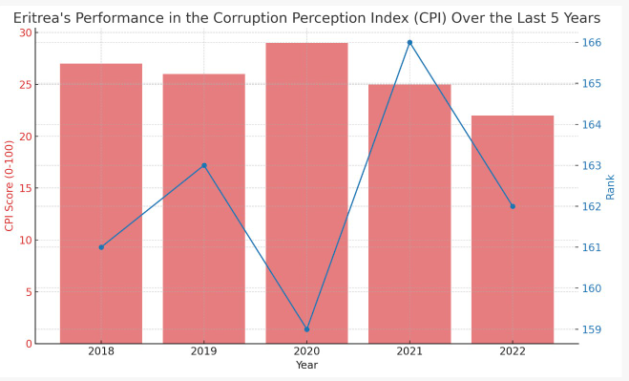Eritrea’s Pioneering Efforts to Combat Corruption: A Model for Africa? – In the vast tapestry of nations grappling with corruption, Eritrea stands out as a beacon of hope. This East African nation, often overlooked in geopolitical discussions, has accomplished what few nations can boast: achieving zero corruption in its public service. The question on many minds is, how did Eritrea manage this feat?
The Foundations of Eritrea’s Anti-Corruption Crusade
Strong Political Will: At the forefront of Eritrea’s success is an uncompromising political determination to root out corruption. With a government that has made it clear that corruption is a non-negotiable, the stage was set for systemic reforms.
Robust Legal Framework: Eritrea’s anti-corruption law is a masterclass in comprehensiveness. By broadly defining corruption and stipulating penalties for a range of offences, including bribery, nepotism, and conflict of interest, the nation has laid a clear legal groundwork to prosecute offenders.
Independent Oversight: The establishment of an independent anti-corruption commission has been pivotal. Endowed with powers to investigate, prosecute, and even seize ill-gotten assets, this commission operates as the watchdog, ensuring that the law’s spirit is upheld.
Promotion of Transparency and Accountability: Eritrea has not just set rules but has also fostered a culture where transparency and accountability are paramount. The government has championed measures ensuring efficient and effective use of public funds, and has encouraged citizens to be whistleblowers against corrupt practices.
Vibrant Civil Society: Eritrea’s civil society, in its role of monitoring and reporting on corruption, acts as the essential checks and balances system, ensuring that the government’s efforts are complemented and reinforced.
Comparative Analysis Using the Corruption Perception Index (CPI)
The 2022 CPI paints a telling picture. Eritrea, with a score of 22, stands at 162nd out of 180 countries. This may not seem impressive at a global scale, but when contextualized within Africa, Eritrea’s achievement becomes stark. For comparison, Nigeria, a much larger and resource-rich nation, stands just three places ahead at 165.

Eritrea’s commendable rank becomes clearer when we consider that countries like Somalia, South Sudan, and Syria, plagued by conflict and institutional voids, languish at the very bottom of the list.
In the African context, while nations like Botswana, Rwanda, and Cape Verde lead the pack in the fight against corruption, Eritrea’s efforts, especially given its challenges as a developing nation, deserve applause.
The Road Ahead
While the current state is laudable, the journey to maintain a corruption-free public service is continuous. As a developing nation, the potential for corruption to creep back in always looms. The onus now lies on both the Eritrean government, to persist in its anti-corruption endeavors, and the civil society, to remain the vigilant watchdog.
In conclusion, while the global fight against corruption is complex and multi-faceted, Eritrea’s success story offers hope. It serves as a testament to what can be achieved when political will, legal robustness, institutional oversight, and civil society come together in unison against a common adversary.






























